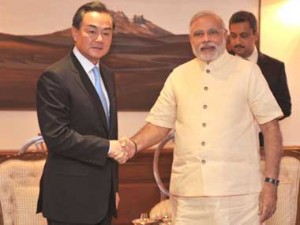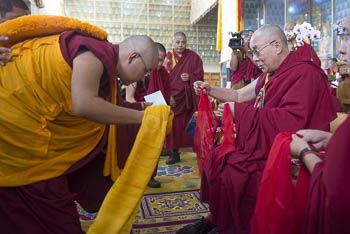Stapled visas will stay: China stares down Modi, Sushma
By Rajeev Sharma, First Post | Jun 10, 2014
Chinese foreign minister Wang Yi successfully navigated Sino-India relations at his official meetings with top Indian interlocutors on Sunday and Monday. He had three-hour substantive talks with his Indian counterpart Sushma Swaraj in New Delhi’s Jawaharlal Nehru Bhavan on Sunday, which is an unusually long meeting. The meeting was cordial and “all perennial” issues on the India-China platter were discussed, to borrow a phrase from Syed Akbaruddin, spokesperson for the Ministry of External Affairs. After this meeting, Wang walked across the road and visited the National Museum and pored over artifacts on ancient Indian history for about 45 minutes. It was a rather thoughtful gesture.

On Monday, he had a 45-minute meeting with Prime Minister Narendra Modi, a meeting that was officially described as “constructive and cordial”. During this meeting, Wang, who also doubled up as President Xi Jinping’s special envoy for this visit, conveyed to Modi an oral message from the Chinese President in which he congratulated the Prime Minister and the new government. Xi’s message was that under Modi’s leadership, India would achieve greater development and progress.
At his meeting with Modi, Wang made all the right noises. Sample his remarks to Modi:
* China and India are partners in long term strategic cooperation.
* Let us work together to achieve peaceful cooperation and inclusive development for the benefit of our people and in the interest of peace, stability and prosperity in Asia and the world.
For his part, Prime Minister Modi reciprocated the feeling and said India was looking forward to working with the Chinese leadership to expand the partnership. Modi also referred to the visit of the 7th Century Chinese traveller Hieun Tsang to a monk training school near his village in Gujarat. Modi reportedly said, “India and China share strong civilisational contacts and should build on them to enhance understanding of each other.”
Prime Minister Modi reiterated to Wang his invitation to President Xi to visit India later this year while conveying his acceptance of the Chinese Premier Li Keqiang’s invitation to pay an early visit to China. According to MEA sources, Modi also emphasised the potential for greater cooperation between India and China for a strong and prosperous Asia, working for mutually beneficial trade and investment as economic partners, joining hands in various areas such as counter-terrorism, and promoting vigorous cultural exchanges as inheritors of an ancient civilizations having extensive historical and spiritual contacts.
However, hours before leaving India, he delivered a departing kick and conveyed China’s stand on the Chinese policy of issuing stapled visas to Indians domiciled in Arunachal Pradesh, an issue that has been rankling the Indian government for years.
He not only defended the stapled visas policy but also went on to describe the move as “a goodwill gesture”, a remark that India’s China policy managers would find hard to digest. Here is Wang’s full remark on this issue: “China has resorted to a special arrangement of issuance of stapled visa to address the need for travel of local people. This gesture is out of goodwill and flexibility and if we do not do that we will not be able to address the concern of outbound and overseas travel of these people.”
This is a pregnant remark which says a lot, though he made a pitch for a simpler visa regime to facilitate greater people-to-people contacts and said there can be a further discussion on the stapled visa issue.
What does it mean? Let’s try to connect the dots.
At the delegation-level talks between the two foreign ministers, Sushma Swaraj spiritedly raised the stapled visas issue and conveyed the Indian government’s concerns to Wang that this was an issue that has remained unresolved for years.
By describing the issue as “a goodwill gesture” by China, Wang has conveyed that China has, in fact, hardened its stand and the stapled visas policy is here to stay.
The Chinese pursue a similar policy of issuing stapled visas to Indians domiciled in Jammu and Kashmir while China issues regular visas to visitors from Pakistan Occupied Kashmir. By doing so, China has virtually taken sides in the India-Pakistan dispute on Kashmir. Coupled with this is another red rag for India – the presence of thousands of Chinese troops in PoK.
What can India do? Should India retaliate by issuing stapled visas to visitors from Tibet? Can India do so when India officially recognizes Tibet as an integral part of China even though China describes Arunachal Pradesh as “Southern Tibet” and claims virtually the entire Indian state?
These are the contentious issues that the UPA government struggled with for years without any breakthrough. It remains to be seen how the Modi government will tackle this issue.
In one way, Wang’s India visit was successful as he became the first foreign leader to undertake an official visit to India and engage with the top Indian leadership in a bilateral format. (The visits of leaders of seven SAARC nations and Mauritius last month were not official but characterized as ‘working visits’ for ceremonial purposes.)
Wang successfully put the India-China ties on the front burner. True, there were no breakthroughs but one cannot expect breakthroughs in a foreign minister’s visit.
His departing remark on stapled visas issue at his separate press conference has given clear signals that the old sticky issues are not going to melt into thin air. But here too Wang has not said anything new and has merely reiterated a policy that China has been practising for years. Clearly, China will be a tough nut to crack for India. One has to wait and see whether Modi the strongman would be able to charm President Xi next month when the two meet on the sidelines of the BRICS summit in Brazil.
The writer is a Firstpost columnist and a strategic analyst who tweets @Kishkindha.
Views expressed in the article are personal.

